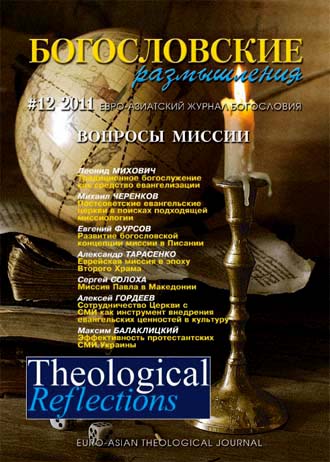Миссия Павла в Македонии: провозглашение Евангелия в качестве антиимперской вести
Keywords:
Миссия Павла в Македонии, провозглашение Евангелия в качестве антиимперской вести, г. Филиппы, г. Фессалоники, оппозиция миссии апостола ПавлаAbstract
Статья "Миссия Павла в Македонии" рассматривает суть оппозиции, с которой столкнулся апостол Павел, когда он принес весть евангелия в Европу. Павел был обвинен в том, что его апостольская международная миссия является антитрадиционной, антикультурной и противогосударственной в другой стране. Главными обвинителями выступили бизнесмены в г. Филиппы и иудеи в г. Фессалоники, используя политическую силу и народные массы против евангелия. Апостол благовествовал в городах с развитым культом императора во время правления Клавдия, который уже изгнал евреев из Рима по религиозным мотивам. И хотя евангелие в своих ключевых терминах имело политический оттенок и вступало в конфликт с царской теологией кесаря, все же это не являлось главной причиной гонений со стороны властей. Павел видит главного оппонента евангелия не в императоре, восседающем в Риме и не в иудеях, религиозных ревнителях, а в Сатане, который использует власть как инструмент борьбы.References
- Периодика:
- Burton Ernest DeWitt. “The Politarchs” in The American Journal of Theology 2.3 (1898): 598.
- Brent Allen. «Ignatius of Antioch and the Imperial Cult» in Vigiliae Christianae 52.1 (1998): 30-58.
- Donfried P. Karl. «The Cults of Thessalonica and the Thessalonians correspondence» in New Testament Studies 31 (1985): 336-56.
- Davies E. Paul. «The Macedonians Scene of Paul's Journeys» in Biblical Archaeologist 26.3 (1963): 91-106.
- Edson Charles. «Macedonica» in Harvard Studies in Classical Philology 51 (n.d.): 125-136.
- Edson Charles. «Cults of Thessalonica [Macedonica III]» in The Harvard Theological Review 41.3 (1948): 153.
- Harrill J. Albert. «Paul and Empire: Religion and Power in Roman Imperial Society» in The Journal of Religion 79.4 (1999): 711.
- Hendrix L. Holland. “Thessalonians Honor Romans.” Th.D. thesis, Harvard Divinity School, 1984.
- Scott Kenneth. "The Divinity of the Roman Emperor» in The American Journal of Philology 53.1 (1932): 82-86.
- Schuler Carl. «The Macedonian Politarchs» in Classical Philology 55.2 (1960): 90-100.
- Tracey L. Howard. “The Literary Unity of 1 Thessalonians 4:13-5:11.” Grace Theological Journal 9.2, 1988. 163-90.
- Wright N.T. “Paul’s Gospel and Caesar’s Empire.” www.ntwrightpage.com/ Wright_Paul_Caesar_Empire.pdf. Цитировано 29.06.11.
- Книги:
- Brent Allen. The Imperial Cult and the Development of Church Order: Concepts and Images of Authority in Paganism and early Christianity before the Age of Cyprian. New York. E.J. Brill, 1999.
- Donfried P. Karl and Johannes Beutler (eds.). The Thessalonians Debate: Methodological Discord or Methodological Synthesis? Michigan: Grand Rapids, n.d.
- Jeffers, The Greco-Roman World of the New Testament Era: Exploring the Background of Early Christianity. Downers Grove: IVP, 1999.
- Horsley A. Richard (ed.). Paul and the Roman Empirical Order. Harrisburg: Trinity Press International, 2004.
- Horsley A. Richard (ed.) Paul and Empire: Religion and Power in Roman Imperial Society. Harrisburg, Pennsylvania: Trinity Press International. 1997.
- Price S. R. F. Rituals and Power: The Roman Imperial cult in Asia Minor. Cambridge: Cambridge University Press. 1986.
- Кардини Франко. «История средневекового рыцарства.» www.countries.ru/library /middle_ages/kardini/part2-1.htm. Цитировано 10.07.2006.
- Макшин Н. А., История древнего мира. М.: ГИПЛ, 1947.
- Райт Томас, Иисус и победа Бога, М.: БИИ, 2004.
- Светоний Г.Т. (пер. М.Л. Гаспрова), Жизнь двенадцати цезарей, Киев: Украина, 1996.
- Райт Н.Т., Иисус и Победа Бога, М.:ББИ, 2004.
Downloads
How to Cite
Issue
Section
License
Copyright (c) 2020 Сергей СОЛОХА

This work is licensed under a Creative Commons Attribution-NonCommercial 4.0 International License.
All articles published in the Journal are distributed under a Creative Commons Attribution-NonCommercial 4.0 International License
By submitting an article for publication in Theological Reflections: Eastern European Journal of Theology the author grants the editors the right to publish the article and distribute it in electronic and print form.
The author reserves all copyrights and the right to use the materials of the article in whole or in part for educational purposes, to write his own dissertations, to prepare abstracts, conference reports, oral presentations, etc., as well as post electronic copies of articles (including the final electronic version downloaded from the journal’s official website) on non-commercial web-resources without the consent of the editorial board and founders.



